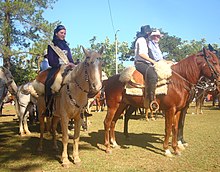Access to the Falls is usually done through one of the three cities in the so-called tri-border between Brazil, Argentina and Paraguay.
The city on the Brazilian side is Foz do Iguaçu - big and reasonably safe by Brazilian standards. The town on the Argentine side is called Puerto Iguazu and is small and pretty. Although the falls are between Brazil and Argentina only, Ciudad del Este, the city on the Paraguayan side, is just across the bridge from Brazil. It's a hectic (but exciting) centre for contraband and cheap electronic goods, and some say it's not safe there.
Immigration control at the border crossings between Brazil, Argentina, and Paraguay are open 24 hours and 7 days a week.
Where are they? South America. Both adjacent .
Paraguay is bigger, but landlocked.
Uruguay is on the Ocean.
Paraguay is about 2.3 times bigger than Uruguay.
Uruguay is approximately 176,215 sq km, while Paraguay is approximately 406,752 sq km, making Paraguay 131% larger than Uruguay.
Let's start alphabetically with bigger, inland Paraguay.
Paraguay in South America.Paraguay
Culture[edit]
Paraguay's cultural heritage can be traced to the extensive intermarriage between the original male Spanish settlers and indigenous Guaraní women. Their culture is highly influenced by various European countries, including Spain. Therefore, Paraguayan culture is a fusion of two cultures and traditions; one European, the other, Southern Guaraní. More than 93% of Paraguayans are mestizos, making Paraguay one of the most homogeneous countries in Latin America.
LANGUAGE - SPANISH
A characteristic of this cultural fusion is the extensive bilingualism present to this day: more than 80% of Paraguayans speak both Spanish and the indigenous language, Guaraní. Jopara, a mixture of Guaraní and Spanish, is also widely spoken.[citation needed]
Both Spanish and Guaraní are official. Most people in Paraguay speak Spanish and use of English is very limited. Outside of Asuncion and big cities Guarani is all you will hear. Due to the extensive use of Guarani, even those who have managed to learn Spanish do not always speak it very well.
In Paraguay, Guarani is almost always spoken as a mix of Guarani and Spanish, known as Jopara, meaning "mixed" in Guarani. The number system in Guarani is rarely used, and is almost always replaced with the Spanish number system.
Some basic greetings in Guarani include:
Mba'eichapa? = How are you?
Iporã = Good
ha nde? = and you?
iporã avei = good as well
In Paraguay Vos is used instead of Tu. There is a slight change in conjugation but not big enough that you won't be understood using Tu. This Vos is NOT the same as Vosotros. Stems do not change in verbs when using "vos", and the ending is always stressed. For example "tienes" changes to "tenés", "puedes" changes to "podés", "vienes" changes to "venís" etc.
In the northern, and eastern parts of Paraguay, Portuguese is spoken widely. In some places, Nueva Esperanza (80% Portuguese speaking), Katuetè (60%) the majority speak Portuguese, almost always the result of Paraguayan born, or first generation Brazilian immigrants. There are many cases of Paraguayans, who were born during the era of Brazilian immigration who speak only Portuguese at home, although also fluent Guarani, but very little or no Spanish.
There are also a number of Mennonite communities throughout Paraguay which speak Low German and regular High German.
SOUVENIR SHOPPING
This cultural fusion is expressed in arts such as embroidery (ao po'í) and lace making (ñandutí).
MUSIC
The music of Paraguay, which consists of lilting polkas, bouncy galopas, and languid guaranias is played on the native harp.
FOOD
Paraguay's culinary heritage is also deeply influenced by this cultural fusion. Several popular dishes contain manioc, a local staple crop similar to the yuca also known as Cassava root found in the Southwestern United States and Mexico, as well as other indigenous ingredients.
A popular dish is sopa paraguaya, similar to a thick corn bread.
Another notable food is chipa, a bagel-like bread made from cornmeal, manioc, and cheese. Many other dishes consist of different kinds of cheeses, onions, bell peppers, cottage cheese, cornmeal, milk, seasonings, butter, eggs and fresh corn kernels.
AUTHORS
The 1950s and 1960s were the time of the birth of a new generation of Paraguayan novelists and poets such as José Ricardo Mazó, Roque Vallejos, and Nobel Prize nominee Augusto Roa Bastos. Several Paraguayan films have been made.
Inside the family, conservative values predominate. In lower classes, godparents have a special relationship to the family, since usually, they are chosen because of their favorable social position, in order to provide extra security for the children. Particular respect is owed them, in return for which the family can expect protection and patronage.[111]
Things to do
Museum tour covers 7 museums, including art, independence and defence.
Museums, malls, a mini zoo, a riverside sandy beach, snow attraction, cathedral, ruins, hall of heroes (Panteon Nacional de los Heroes).
A church featuring wood covered in gold. The Jesuit circuit. Musical instruments museum. Tour of the captal, Asuncian, seeing large municipal buildings.
Waterfalls Crystal Waterfall and Iguazu Waterfall side trip.
Useful Websites
https://py.usembassy.gov/covid-19-information-2/
Eco Tour Agency
https://www.facebook.com/Paraguay-Tourism-Authority-220322248056987/
https://wikitravel.org/en/Paraguay
https://www.visitparaguay.travel/v1/circuito/3-gold-circuit
https://wikitravel.org/en/Igua%C3%A7u_Falls
About the Author
Angela Lansbury is British, has lived in the USA and Singapore. Is a travel writer currently confined to Singapore and the UK and catching up on the world oline and sharing her investigations with you.





















No comments:
Post a Comment